Music is everywhere we turn, playing a big part in all of our lives – but how does it really affect our brains and our bodies?
“Without music, life would be a mistake” – Friedrich Nietzsche
1. Happy or sad music affects our ability to see neutral faces:
Generally, when we hear a sad song, we can identify that it sounds sad and the same goes for happy compositions – but this isn’t because it makes us feel particularly happy or sad, it’s because our brain responds in a certain way to sad music, and a different way to happy music.
One study explained how after hearing a shot piece of music, participants were more likely to interpret a neutral expression as either happy or sad, depending on the tone of music they heard.
There are actually two types of emotions related to music: perceived emotions and felt emotions – both of which are very different entities. Sometimes, it is possible to understand the emotions of a piece of music without feeling them ourselves, which explains why some people enjoy listening to sad music where others may find it depressing.
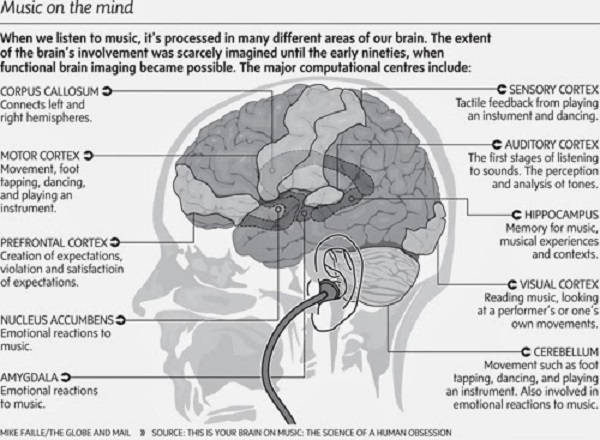
2. Ambient noise improves creativity:
A moderate noise level is a perfect volume for getting the creative juices flowing. Low noise levels can make us feel more creative, but moderate noise levels improve that creativity a great deal more by causing a slight difficulty in our processing, which spurs on our creative processing.
However, stay away from high noise levels as it can impair our creative thinking as our brains are too overwhelmed with the information it has to process. This is similar to how temperature and lighting can affect our productivity and the effect it can have on our brains.
3. Our music choices can predict our personality:
In a study which looked at couples who spent time getting to know each other, examining each other’s top ten favourite songs allowed them to accurately predict the personality traits of the other person, using five main personality traits:
Openness to experience, extraversion, agreeableness, conscientiousness, and emotional stability.
Some traits were more accurately predicted than others, for example, openness to experience, extraversion, and emotional stability was the easiest to guess correctly based on music tastes, whereas conscientiousness was harder to predict.
A genre can also give an indicator as to somebody’s personality, according to a study carried out by Heriot-Watt University.
Whilst these results from the study generalize personality traits, there are some links that have been proven from other studies into extroversion/introversion and favourite genre of music:
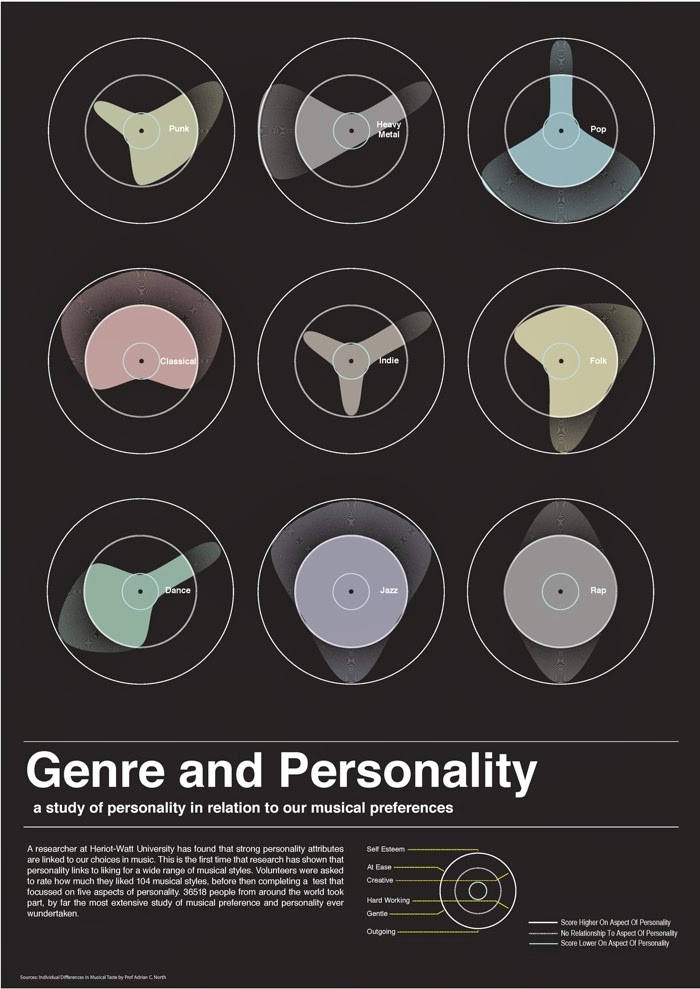
To break it down, here is the connection they have found:
- Blues fans are said to have high self-esteem, are creative, outgoing, gentle and at ease.
- Jazz fans have high self-esteem, are creative, outgoing and at ease
- Classical music fans have high self-esteem, are creative but introverted, but also at ease
- Rap fans have high self-esteem and are outgoing
- Fans of opera have high self-esteem and are creative but gentle
- Country and western fans are hardworking and outgoing
- Reggae fans have high self-esteem, are creative, outgoing, gentle and at ease, but aren’t hardworking.
- Fans of dance music are creative and outgoing but not gentle
- Indie fans tend to have low self-esteem, are creative, but aren’t hard-working and are not gentle
- Bollywood fans are creative and outgoing
- Rock/Heavy metal fans tend to have low self-esteem, are creative, gentle and at ease, but are not hard-working and aren’t outgoing.
- Soul fans have high self-esteem, are creative, outgoing, gentle and at ease
- Chart pop fans have high self-esteem, are hardworking, outgoing and gentle, but are not creative and not at ease.
4. Music can distract us whilst driving:
How many people listen to music whilst they are driving? Almost everybody, right? Well, it can actually impact your driving and distract you from the road, studies have found.
This study was carried out on teenagers and young adults and consisted of drivers taking part in a series of tests listening to their own choice of music, silence and “safe” choices provided by researchers whilst driving.
Drivers made more mistakes and drove more aggressively when listening to their own choice of music, and the music provided by the researchers proved to be more beneficial than no music at all.
5. Our motor and reasoning skills can be improved by music training:
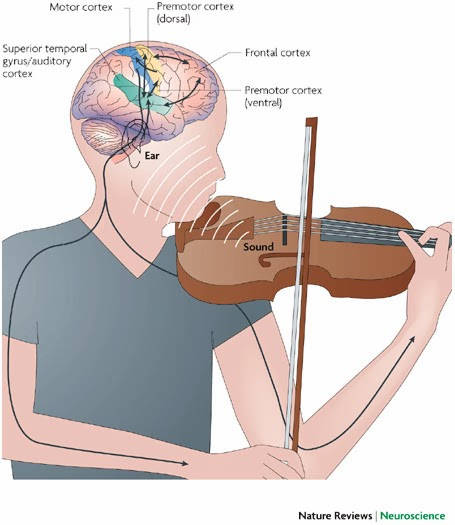 Learning a musical instrument can be beneficial in more ways than you may realise. One study on children showed that after three years or more of musical training performed better in auditory discrimination abilities and fine motor skills than those who didn’t learn to play an instrument at all.
Learning a musical instrument can be beneficial in more ways than you may realise. One study on children showed that after three years or more of musical training performed better in auditory discrimination abilities and fine motor skills than those who didn’t learn to play an instrument at all.
They were also found to test better on vocabulary and nonverbal reasoning skills, which is based strongly on understanding and analyzing visual information.
6. Classical music improves visual attention
Stroke patients can also benefit from musical training and exposure, showing improved visual attention whilst listening to classical music in one particular study. To compare different musical styles, the study also used white noise and silence and found that, similarly to the driving study mentioned earlier, silence resulted in the worst scores.
Although this study was very small and needs to be explored further for validation, it is fascinating how music and noise can affect our senses.
7. Music helps us exercise:
Perhaps the most common fact that most of us put into practice on a daily basis – music can help you exercise better.
In 1911 a study found that cyclists pedaled faster whilst listening to music than they did whilst working out in silence. An explanation for this is that listening to music drowns out our brain’s signals of fatigue by grabbing our attention and blocking out the signals that our bodies send when we’re getting tired.
When we listen to music, we can push through the pain to exercise longer and larder but it can also help us to use our energy more efficiently. A study carried out in 2012 showed that cyclists who listened to music whilst working out required 7% less oxygen than those who cycled in silence.
However, the tempos must be matched to the type of work-out that you’re performing, or it can have a negative effect.
8. One-sided phone calls are more distracting than normal conversations:
Similar to how music can affect our brain, phone calls where we can only hear one side of the conversation can negatively affect us in a significant way.
82% of people found overhearing part of a phone conversation annoying and during a study where participants had to complete puzzles whilst half of them were listening to phone conversations and half were listening to the full, two-sided conversation – it was found that those who heard the one-sided conversation found it more distracting than their counterparts.
They had also remembered more of the conversation than the others, showing their attention was focused on the one-sided discussion rather than the task at hand.
Some recent research has shown that there’s a ceiling effect on music at around 145 bpm, where anything higher doesn’t seem to add much motivation, so keep that in mind when choosing your workout playlist.
Here is how this breaks down into different genres:
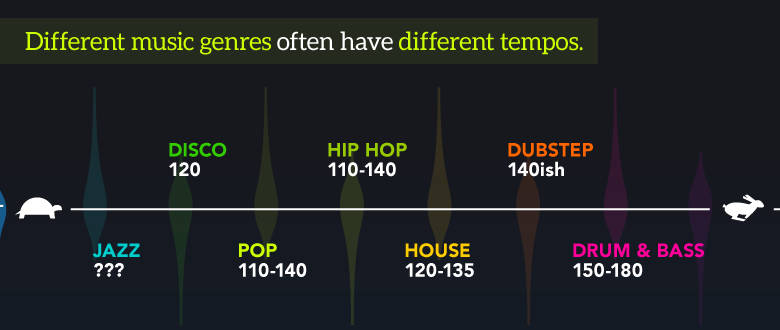
Now if we team up these different “tempos” with the actual work-out we’re doing, we can be in much better sync and find the right beat for our exercise. If you match up the above with the graphic below it should be super easy to get into a good groove:
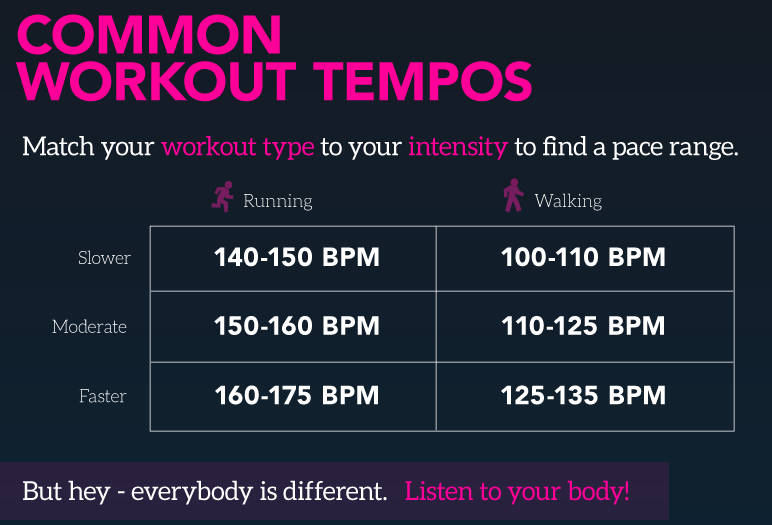
What have you noticed about how different songs affect you? Do you feel as though your musical tastes reflect your personality? Let us know your thoughts in the comments.
https://www.facebook.com/ScienceNaturePage/videos/1284891671643088/
Image credits: Suites Culturelles, Nature Reviews Neuroscience, Ali eminov,PaceDJ





What a great piece of information! Altho, I am not surprised…I am a big music lover, I must have music everyday…it definitely boosts my productivity and it lifts my spirits when I am feeling down…I like so many different genres, so the implications of a specific genre affecting us differently, seems to crossover, at any given time…so many implications! All I know for sure is that, music, can make u feel better…can make u have a good cry when u need it and it makes u move…I can’t listen to music without dancing…even if it’s only chair dancing when I’m online…♫ Because, I’m happy…♫.
Great article. But just a FYI – Dubstep is not 140 bpm. Its usually a 70 bpm range… -+5 bpm. I’m a dj, and spin a lot of it. They make it in 140 to have access to quick high hats and more range to play with sound. Other than that…its a normal 70bpm pace like some hip-hop. They say it 140 but all they are doing is doubling the bpm. It still has the same structure.
Well I drive my family crazy, because when they ask me what kind of music I like, I say good music. Maybe with the exception of children’s music.
There are also studies going on, after the discovery of acoustic chambers from ancient Egyptian culture that were used in medicine…..and we are so arrogant to think they were primitive.
Interesting that silence is conspicuously ABSENT as part of being a musician!
Ineed huge swaths of silence in my day to hear my instrument. The value of silence shouldnt be ignored…..not all of us need background noise at all.
How does this relate to music lovers who have a preference for all types of music? I love heavy metal, opera, classical, pop, jazz, and dance and all of these seem to be polar oppisites. And I can even switch them up and listen to different genres consecutively so it’s also not based on what particular mood I’m in.
Very glad to see mass consciousness becoming aware of this information, and to it put to use in everyday life.
Interesting informations! THX! Music helps me to feel better..relaxing, creating, dancing, moving etc. 🙂
Every child should learn to play a musical instrument at an early age to achieve the maximum benefit of music. If just a portion of time that is wasted on video games and movies in today’s youths, were focused on learning to play ann instrument, the whole world would benfit tremendously. Learning to play as an adult like I did is also tremendously beneficial in overall quality of life and internal peace. Who will the next generations Mozart be if playing music is lost to the machine? Music is one of the most powerful forces the human race has, it can be and has been used to influence both good and evil, the power of music should not be abused and cannot be lost, for the sake of the human race, teach someone to play.
Music can help me understand the lyrics. Hahaha :3
Not true. I love all types of alternative/ rock/metal music. I do not have a low self esteem, I’m a hard working mother of 4kids with fulltime job that manages a data processing / programming dept for large company. I love going out with friends and mostly enjoy QT with my husband and kids. I also love being a home body as well. So, i think you need to do more researching before labeling people based on what music genre the prefer before writing this article!
What about eMusic?
Music is my most common happy place, would die without it in my life everyday.
Wow Very Informative.Smile.
Music makes me feel like I’m floating in space. I can close my eyes and drift away. I love it. I’m listening to Above and beyond at the moment. I get so connected to music that I can close my eyes and create images from nothingness.